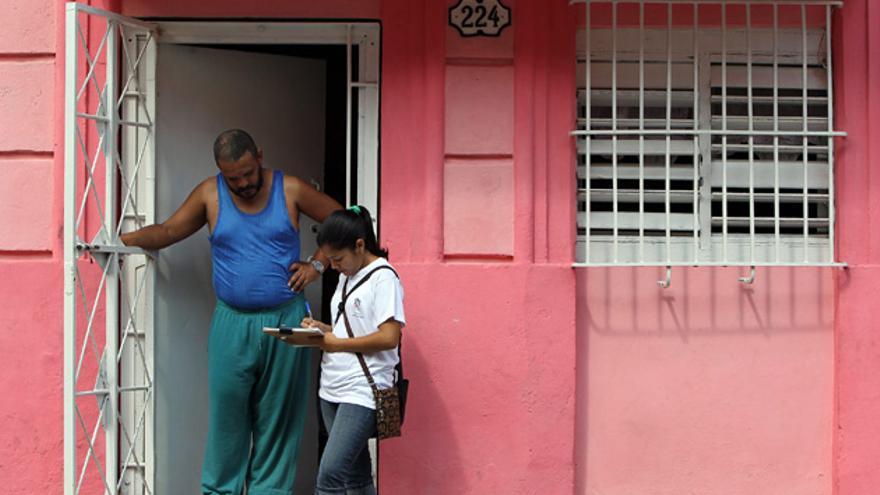
![]() 14ymedio, Reinaldo Escobar, Havana, 22 February 2019 — As a sociological research tool, surveys have enormous utility in testing the state of opinion of the population in relation to different issues.
14ymedio, Reinaldo Escobar, Havana, 22 February 2019 — As a sociological research tool, surveys have enormous utility in testing the state of opinion of the population in relation to different issues.
The credibility of a survey depends on several factors, including the selection of the sample, the veracity of the respondents and, of course, the honesty of the interviewers who are not supposed to demonstrate what answers they prefer but rather collect the data to learn the truth.
In a country like Cuba, where opinions that different from the official thinking are often penalized, it is difficult for respondents to say what they really think, especially if what they are being asked about is related to political issues.
When a pollster shows up at a house, tablet in hand, to ask a citizen whether or not they plan to approve the new Constitution in the February 24 referendum, it is likely that, before answering, they will look in all directions to check if they are being filmed. It’s not paranoia, it’s pure self-preservation.
The respondent presumes, quite rightly, that if the woman or man, young or old, has authorization to ask questions on the street, it is because she or he is a person trusted by the Government, which automatically makes him or her an informant for the political police. Can we trust the answers?
When an organization independent of the State, inside or outside of Cuba, tries to carry out a survey with this type of questions, it cannot count on the services of “the comrades of the CDR [Committee for the Defense of the Revolution].” They are obliged to ask opposition activists or independent civil society to carry out the survey.
These citizens, however elevated their sense of responsibility and above all, however high their honesty, will go to their environment, to the people they deal with. Can you trust that the answers they collect are from a representative sample of the population?
With these reservations, we should look at two recent surveys on voters’ opinions regarding the constitutional referendum on February 24.
One, carried out by the Study Group on Social Dynamics of the Cuban Observatory of Human Rights (OCDH), found that 33.5% of Cubans intend to reject the new Constitution. This disagreement is broken down by 19.2% with the intention of supporting NO (19.2%), 9.2% who will leave the ballot blank and 5.1% who will annul* their ballot.
The other survey, also carried about by a non-government organization, Cubadata, believes that 42.4% of the voters will vote YES, 41.6% will go to the polls to mark NO and 16% will opt to abstain.
Most likely, the government has its own surveys, conducted with much more resources. Unfortunately, they are not public.
There is talk about at least two surveys conducted by the authorities. The Union of Young Communists conducted one in Havana high schools, where students are 16 or older and eligible to vote. According to testimonies collected by 14ymedio from representative students, most of the respondents expressed their outright indifference to the referendum and, at the insistence of the pollsters, said they were not decided.
The other survey was conducted by the People’s Opinion Department belonging to the Central Committee of the Party. Their results are considered a “State secret” and only the recommendations have emerged in the form of “directions” to the media.
What seems indisputable is that if the party-government had overwhelming YES results in a survey on the referendum, it would have been published a while ago. Clearly scruples would not be an impediment.
The countdown can now be expressed in hours. There are many signs that the rulers are nervous, because they are used to winning with majorities close to 100%. Today they know that they will not be able to get the support of 97.7% of the electorate that they supposedly received in the referendum of February 15, 1976.
For revolutionary triumphalism, a YES vote of 70% or less would be a humiliation. In contrast, for opponents, who barely got 1% (plus 1.3% blank and annulled ballots) 43 years ago, a 30% NO vote would be a great victory after an overwhelming campaign by the Government in favor of YES.
*Translator’s note: Annuling the ballot can be accomplished by writing something on it or crossing out everything, but not checking any of the boxes.
______________________________
The 14ymedio team is committed to serious journalism that reflects the reality of deep Cuba. Thank you for joining us on this long road. We invite you to continue supporting us, but this time by becoming a member of 14ymedio. Together we can continue to transform journalism in Cuba.
